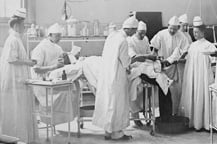Investing in the Future
 When the City Hospital building on Scranton Road was replaced in 1889, one significant upgrade involved bedding. Straw had been used for the original hospital beds. The new hospital featured hair mattresses. In fact, feather pillows, brass-mounted iron bedsteads, and steam heat were precious innovations at the 1889 new City Hospital, which cost $91,500 to construct.
When the City Hospital building on Scranton Road was replaced in 1889, one significant upgrade involved bedding. Straw had been used for the original hospital beds. The new hospital featured hair mattresses. In fact, feather pillows, brass-mounted iron bedsteads, and steam heat were precious innovations at the 1889 new City Hospital, which cost $91,500 to construct.
In more recent years, significant investments were made to improve clinical care, supporting MetroHealth's position as an academic medical center with advanced technology. An electrophysiology (EPS) laboratory opened in the Heart and Vascular Center, providing diagnostic and treatment services for cardiac arrhythmias. The new lab supports MetroHealth's renowned research in cardiac arrhythmias. Results of the ABCD (Alternans Before Cardioverter-Defibrillator) trial helps cardiologists determine which patients are at highest risk for sudden cardiac death, the leading cause of heart related death in the United States. Part of a comprehensive cardiac program at MetroHealth, this kind of pioneering research and treatment has demonstrated improved quality outcomes: The AHA awarded MetroHealth Performance Achievement Awards in the treatment of coronary artery disease, heart failure, and stroke.
A state-of-the-art endoscopy suite was also recently constructed. With "blue light" technology and HDTV imaging, it offers physicians a chance to view a patient's digestive tract with greater detail than ever before. The HDTV signal from a video processor, the high definition gastroscope and colonoscope, and the blue light produced by the narrow band imaging technology result in exquisitely clear views of gastrointestinal tissue and the fine capillaries that weave throughout. Life-threatening lesions can be discovered at the very earliest stages, when removal is simple and the result is cancer prevention. A teaching center with a big screen telestration unit allows MetroHealth specialists to instruct referring physicians, residents, and students in the latest techniques in diagnosis and treatment.
With technologically advanced surroundings, MetroHealth surgeons can introduce new procedures to improve patient outcomes.
More Information